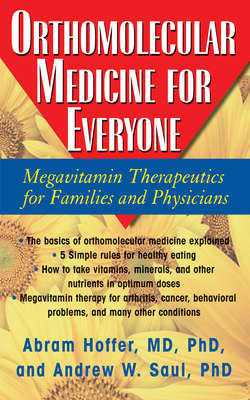Читать книгу Orthomolecular Medicine for Everyone - Abram Hoffer M.D. Ph.D. - Страница 16
На сайте Литреса книга снята с продажи.
WHAT KIND OF FOOD DO WE NEED?
ОглавлениеWe must live on food that our bodies can digest and which will provide us with the essential nutrients. These are nutrients that cannot be made in the body; in other words, we must eat food to which we have adapted during our evolution.
Animals are divided into three main groups according to their major food source:
• Herbivores live primarily on vegetation.
• Carnivores live primarily on meat.
• Omnivores can live on, and in fact require, a large variety of foods from animal and vegetable sources. This group includes humans, apes, bears, etc.
Herbivores have adapted to their food supply by developing a digestive system that can break down cellulose-rich foods and digest them. Carnivores have different digestive tracts. Omnivores have systems that can deal with some vegetable food and all flesh, but which cannot break down grass, for example, to its elementary glucose. It is not difficult to understand why forcing cows to live on meat or feeding grass to lions would make them ill. In other words, our health depends upon eating food to which we have been adapted over 100,000 years of evolution. Unfortunately, most of our food is processed and has been so altered that it bears little resemblance to the food consumed by our caveman ancestors. For most of our evolutionary development, we lived on food that is similar to food consumed by animals and fish, which still live in a natural state. The best zoos try to follow this principle in feeding their animals.
We, as omnivores, are not all alike. We differ physically in nature, in personality, in blood types, and in fingerprints. We also differ in our nutritional requirements. The range is enormous, sweeping across the omnivore spectrum from people who are almost entirely carnivores to people who are almost entirely vegetarian; most people are somewhere in between. There is no single diet that is “the” diet for everyone. When anyone recommends “the” diet for everyone, it is a lie—certainly many people may be helped, but not all. So far there is no generally accepted way, except by trial and error, of determining an individual’s optimum diet.
Our food requirements also vary with age, activity, gender, stress, and presence of disease. An infant can digest human milk but he or she may be lactose-intolerant as an adult. A pregnant woman must have a diet that is different from her nonpregnancy diet. Most people are somewhat aware of this. Requirements for supplements also vary: the need for any one nutrient may vary a thousandfold, though usually a narrower range of variation exists. The need for supplements decreases as the nutritional quality of all the food on our plates increases.
